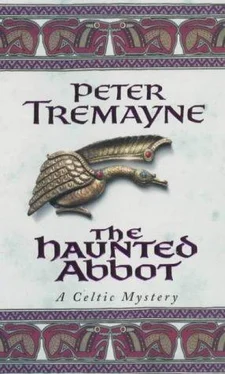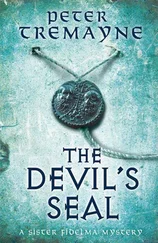Peter Tremayne - The Haunted Abbot
Здесь есть возможность читать онлайн «Peter Tremayne - The Haunted Abbot» весь текст электронной книги совершенно бесплатно (целиком полную версию без сокращений). В некоторых случаях можно слушать аудио, скачать через торрент в формате fb2 и присутствует краткое содержание. Жанр: Исторический детектив, на английском языке. Описание произведения, (предисловие) а так же отзывы посетителей доступны на портале библиотеки ЛибКат.
- Название:The Haunted Abbot
- Автор:
- Жанр:
- Год:неизвестен
- ISBN:нет данных
- Рейтинг книги:5 / 5. Голосов: 1
-
Избранное:Добавить в избранное
- Отзывы:
-
Ваша оценка:
- 100
- 1
- 2
- 3
- 4
- 5
The Haunted Abbot: краткое содержание, описание и аннотация
Предлагаем к чтению аннотацию, описание, краткое содержание или предисловие (зависит от того, что написал сам автор книги «The Haunted Abbot»). Если вы не нашли необходимую информацию о книге — напишите в комментариях, мы постараемся отыскать её.
The Haunted Abbot — читать онлайн бесплатно полную книгу (весь текст) целиком
Ниже представлен текст книги, разбитый по страницам. Система сохранения места последней прочитанной страницы, позволяет с удобством читать онлайн бесплатно книгу «The Haunted Abbot», без необходимости каждый раз заново искать на чём Вы остановились. Поставьте закладку, и сможете в любой момент перейти на страницу, на которой закончили чтение.
Интервал:
Закладка:
Mul shook his head.
‘I know that there are some who are in hiding. They refuse to accept the decisions made at Whitby and obey Canterbury. Rules! Christian rules!’ He made a gesture like spitting. ‘Who cares? In this land we will continue to call the vernal equinox by the name of the goddess Eostre; others may celebrate it as Pascha, the resurrection of the new god, Christ, or even as Pésah, the Jewish Passover feast … but it is still the vernal equinox.’
He saw Fidelma studying him in surprise and smiled disarmingly.
‘Just because I am a farmer, you need not think that I have no knowledge. I have been to the coastal ports and spoken with Phoenician traders. I know all about Pésah and the like. All farmers know and name the seasons — seasons are seasons however you want to name them.’
‘Do you know of a young woman of Éireann with red-gold hair who lives near the abbey?’ interrupted Eadulf.
Mul was shaking his head when he suddenly smiled.
‘Do you mean young Lioba? She is no woman of Éireann.’
Eadulf tried to recall if he had heard the name before. He thought he had but could not be sure.
‘That’s a Saxon name,’ Fidelma pointed out, glancing at Eadulf.
‘True enough,’ agreed Mul. ‘Her father was a farmer in the hills beyond the abbey. He is dead now. He died in the Yellow Plague. Her mother also died a year or so ago. But her mother had been a slave taken from a kingdom called Laigin. That’s who you mean. Lioba.’
Laigin was one of the five kingdoms of Éireann, as well they knew.
Mul suddenly chuckled lewdly.
Eadulf frowned slightly. ‘What does your humour imply, Mul?’
‘That for all the piety at the abbey, Lioba seeks her pleasures there.’
‘I am told that this Lioba bears a resemblance to Gélgeis,’ hazarded Eadulf, pursuing a sudden train of thought.
Mul rubbed his chin. ‘I would not know. Lioba must have been younger than the abbot’s wife.’
‘Let us return to the Irish religious in hiding. What do you know about them?’ asked Fidelma.
‘Little enough. As Christians, I do not care about them. I think it is said that they are down Tunstall way. They never bother me nor I them.’
He reached for more cider and grimaced with a bitter expression before sipping it.
‘I want little to do with you Christians though I will go this far: all gods are the same when it comes to seeking their help. They are all united in ignoring your pleas and cries for help. I know that. There are three graves on the hill above the farmstead that bear me witness.’
‘Christ was not responsible for the murder of your wife and children,’ admonished Eadulf.
‘No? If this Christ were an omnipotent deity he could have done something. Don’t you teach that he is all powerful, all loving and ordains everything that happens? No, gerefa, all gods are alike. Silent to our suffering.’
Fidelma looked at Eadulf and shook her head quickly. It was not wise to pursue the argument further.
‘Have you heard of any trouble between the abbey and those who adhere to the Rule of Colmcille … the blessed one whom you call Columba?’ she asked.
‘Trouble? Cild had two of them executed, I know that. The others he had driven out into the marshes. Perhaps they have returned to your land? Perhaps it is they who are hiding in Tunstall? There are so many deaths here, Sister, that I am surprised you bother to seek the reasons for one or two. Theanswer to all of them lies between two people — Cild and Aldhere.’
‘It seems that there is no longer any law here,’ muttered Eadulf. ‘I would not believe it. I was brought up to believe that no one would dare to disobey the Law of the Wuffingas and a gerefa. Anarchy seems to reign in this land.’
Mul grinned cynically.
‘Not anarchy, gerefa; but men who have swords and no compunction about using them. And, of course, such men have no loyalty to anyone other than themselves.’
Fidelma held her head to one side questioningly.
‘Again you seem to imply something more than the words you use, Mul.’
The farmer nodded slowly.
‘Speak to people in any market place and you will hear what they say.’
‘We are not in a market place, so I would like to hear what you say. What have you heard?’
‘I have heard that Aldhere would welcome a new King in this land. I have heard too that his brother, Cild, would also welcome a new King. Yet the word is that the brothers have different Kings in mind.’
‘Can you explain further?’ Fidelma pressed.
‘This land is viewed with envy by Wulfhere of Mercia to the west and by Sigehere of the East Saxons to the south. Either King would be a fool not to take advantage of the conflict raging in this small corner of the kingdom.’
‘Are you saying that you have definite word that either Cild or Aldhere is in league with Wulfhere or Sigehere?’ Eadulf was aghast.
‘Definite word? No, of course not. I tell you what I have heard in the market places.’
‘Idle gossip. Speculation without facts!’ suggested Eadulf. Fidelma noticed that even as he spoke Eadulf was less than confident and seemed preoccupied with his own thoughts.
‘If the land of the South Folk fell, then the land of the North Folk would follow swiftly,’ Mul snapped, undeterred.
‘You might well be right,’ conceded Fidelma. ‘It seems that there is no peace between peoples anywhere in the world. Thereare plots and conspiracies between the five kingdoms of my own island. During our visit to the land of the Britons we found their kingdoms divided against each other. Why should the lands of the Angles and the Saxons be any different? However, that is not why we are here.’
Mul sniffed and once more reached for the cider jug. Finding it empty, he rose and went to the cupboard and drew out another flagon.
‘No,’ he said, ‘you are here to find out how Cild murdered your friend Botulf.’
‘We are here to find out first if Cild murdered Botulf,’ corrected Eadulf. ‘If he did so, then the “how” will follow.’
‘And moreover whether he killed his wife, Gélgeis,’ Fidelma added. ‘We are here to prevent more tragedy and such an effusion of blood as this land has never seen before.’
Chapter Fourteen
The blizzard had passed on during the night. The morning, while still icy cold, was bright with the sky pastel blue and the sun almost white in its weakness. Fidelma and Eadulf had passed the night in the comfortable warmth of Mul’s farmhouse. They had broken their fast with Mul but waited until he was out of earshot before they made their prayers to St Stephen, for it was his feast day — the feast of the first martyr for the new faith. Then, after paying Mul the promised coin for the night’s lodging, they left on their journey northwards. The roads were filled with snow banks, crisp flakes that had drifted in the blizzard and piled against hedge and ditch. The journey was not going to be without hardship.
Fidelma, however, had slept well and felt much stronger than before. The ague that she had endured was now receding and she was more comfortable and relaxed.
Mul’s smoking chimney had barely disappeared behind the hill when Eadulf turned to Fidelma. There were several questions that he had wanted to ask but had been unable to in the intimacy of the farmhouse in which Mul would hear even the whispered word.
‘What did you mean by “preventing such an effusion of blood as this land has not seen before”?’ Eadulf demanded.
Fidelma’s expression was serious.
‘Why am I so keen to prevent this ritual fast from taking place, Eadulf?’
‘To prevent the death of Gadra … to find out the truth about the deaths of Gélgeis and Botulf …’ Eadulf thought the reasons were surely obvious.
Читать дальшеИнтервал:
Закладка:
Похожие книги на «The Haunted Abbot»
Представляем Вашему вниманию похожие книги на «The Haunted Abbot» списком для выбора. Мы отобрали схожую по названию и смыслу литературу в надежде предоставить читателям больше вариантов отыскать новые, интересные, ещё непрочитанные произведения.
Обсуждение, отзывы о книге «The Haunted Abbot» и просто собственные мнения читателей. Оставьте ваши комментарии, напишите, что Вы думаете о произведении, его смысле или главных героях. Укажите что конкретно понравилось, а что нет, и почему Вы так считаете.











